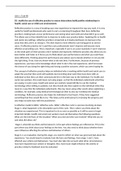Unit 1, Task 4B
D1- Justify the use of reflective practice to ensure interactions build positive relationships in
health, social care or child care environments
Reflective practice is a way of studying your own experience to improve the way you work. It is very
useful for health professionals who want to carry on learning throughout their lives. Reflective
practice is looking back at your performance and seeing what went well and what didn’t go so well.
This allows you to then identify how to improve to make your practice better. Applying this to health
and social care settings, reflective practice is important as it leads practioners to improve in the
areas that they aren’t as strong in. This then leads to more effective care being given to service
users. If reflective practice isn’t used then care professionals won’t improve and become more
effective at providing care. This is important, especially if care is at a poor standard, it won’t improve
as the weak parts of their practice aren’t tackled and improved. Reflective practice also allows you to
learn better and faster as it forces you to think about your performances and what you could have
done differently. Thinking about the performance also allows you to decide whether or not you did
the right thing. If not, then you know what to do next time. Furthermore, because of previous
experiences, you have extra knowledge about what to do in the next experience, which increases
the chance of you doing the right thing and having a positive outcome, which you were hoping for.
The concept of reflective practice helps an individual who is working within health and social care to
adapt the way that they work with patients but recording what work they have done with an
individual so that they can then communicate this in the best way to the individual. For health and
social care workers, this could mean not using jargon, so that the individual understands what they
are saying. In some cases, health and social care workers would still like to use the medical
terminology when talking to patients, but they should also then explain to the individual what they
mean in a way that the individual understands, this may mean using other words when explaining a
condition, for example, using medical terminology but then to also say it without the medical
terminology. Reflective practice also helps the individual to feel heard, if they have suggested
something that they would like to try. This helps as the professional is reviewing the progress and
also helps to build trust with the practitioner.
A reflective model is Gibbs’ reflective cycle. Gibbs’ reflective cycle is a process involving six steps.
Stage 1, what happened, is the description part of the cycle. This is where you think about the
situation you experienced. This is important to do as soon as possible as it will be easy to forget
important details. Health and social care workers must ask themselves the following questions.
What are the brief facts of the situation? What occurred and who was involved? What did you do
and what did others do?
Stage 2, what did you think and feel about it, is the part where feelings are reflected on. This is the
part where you think about your feelings at the time. You also need to think about whether there
were influences affecting the actions and behaviour of others.
Stage 3, is an evaluation. During this stage, you need to reflect on what was good and bad about the
experience. You would need to evaluate how the facts and feelings, from stage 1 and 2, have
affected your actions and behaviours. You must also take into account what other circumstances
may have impacted your actions or thoughts. Also, how issues might influence the activity or
practice related to feedback must be evaluated.





